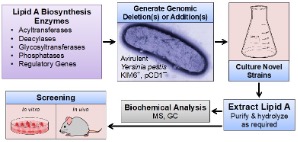contact
Shereece Singleton
Office Manager
F 410-706-0865
Ernst Lab Projects
TLR4 Ligands for Use as Adjuvant Molecules in Vaccines
This project generates rationally designed and engineered lipid A structures (TLR4 Ligands) with altered proinflammatory responses via expression of heterologous lipid A biosynthetic enzymes, a process termed BECC (Bacterial Enzymatic Combinatorial Chemistry). Individual lipid A structures are tested for adjuvant potential in a variety of in vitro and in vivo models. Two BECC molecules are currently part of the NIAID Adjuvant Development Program to formulate and evaluate each for IND enabling testing with three established immunogenic vaccine antigens.

Mass Spectrometry based Bacterial Identification Diagnostic/Library Development
The major goal(s) of the project is to establish a rapid, small scale extraction procedure for lipids isolated from the membranes of Gram positive and negative bacterial and fungal species for rapid identification that can also be used as a potential diagnostic to improve patient outcomes. Through work with various collaborators, the Ernst lab has identified the lipid structures of various pathogenic and environmental bacterial species. All these structures are continuously added to a growing reference library of lipids. On-going goals for this work include the ability to reliably extract bacterial and fungal lipids direct from patient samples.
Development of Antibiotic Adjuvants for Gram-Negative Bacteria
This project focuses on elucidating specific changes in the structure of lipid A from E. coli, P. aeruginosa, and Klebsiella using mass spectrometry and gas chromatography to determine the effect of the novel compounds synthesized in the Melander Lab.
Novel Live Vaccines with Modified Lipid A for the Prevention of Shigella Diarrheal Disease
The aim is to engineer and evaluate live attenuated Shigella subspecies vaccines with rationally-designed alterations in lipid A molecule that will generate strains with reduced reactogenicity when used as a live oral vaccine.
Colistin Resistance in Extensively Drug-Resistant Gram-Negative Pathogens
The major goals of this project are to utilize an extensive collection of colistin-resistant Gram-negative bacterial strains identified from patients to develop a quantitative test for colistin resistance that is clinically applicable, elucidate remodeling of lipid A conferring resistance to colistin in mice and humans, and investigate how colistin adjuvants abrogate resistance.
Cystic Fibrosis-specific Pseudomonas aeruginosa Lipid A Modifications and Lung Infections
This project uses genetic, molecular biology, and analytical approaches to define biosynthetic genes and regulatory mechanisms required for the synthesis of cystic fibrosis-specific lipid A modifications in Pseudomonas aeruginosa. The Ernst lab continues to investigate the unique environment of the CF lung using mass spectrometric imaging to identify the unique inflammatory properties and structural regulation of P. aeruginosa lipid A in vivo.



